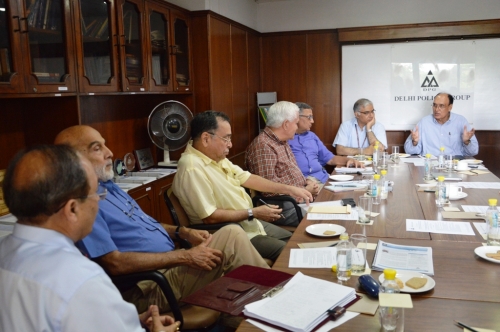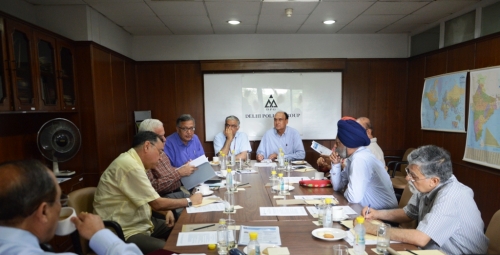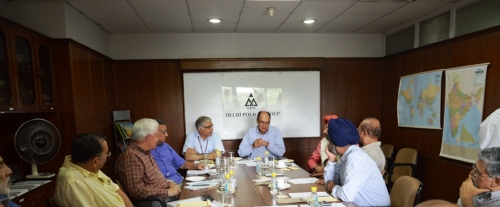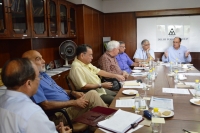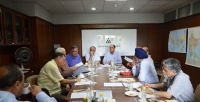Roundtable Discussion on India-US Summit (June 7, 2016)
Date: June 17, 2016
A roundtable discussion on the Summit meeting between Prime Minister Narendra Modi and U.S. President Barack Obama in Washington DC on June 7, 2016, was held at the DPG Office on June 17, 2016. There were 20 participants.
At the outset, Ambassador H.K. Singh, Director General, reviewed major developments inpacting India’s security scenario and outlined the progress achieved at the Modi-Obama summit as well as remaining challenges in India-U.S. ties.
In the first part of the roundtable discussion which was chaired by Ambassador K.S. Bajpai, Chairman-Emeritus, Delhi Policy Group, views were exchanges on the outcomes of the Summit and their significance for both India and the U.S. It was pointed out that under PM Modi’s energetic brand of pragmatic, interest-based diplomacy, past ideological constraints had given way to self-confident engagement of the U.S., relations with which are now at the top of India’s foreign policy priorities. The deftness and imagination of PM Modi’s foreign policy, laying down comprehensive and purposeful guidelines for preserving India’s national security interests, was recognized. While noting substantive outcomes in several areas from civil nuclear energy to defence, it was pointed out that despite the potential of India-U.S. economic ties, there is an increasing mismatch between India’s geo-political ambitions and caution towards a more open trade and investment climate.
In the second part of the round table discussion, there was extensive debate on various aspects of India-U.S. defence relations, from the Roadmap for maritime security cooperation to defence technology and trade. The fundamental importance of India’s defence establishment overcoming the ‘hesitations of history’ was underlined. It was pointed out that while conclusion of LEMOA marked progress in operational defence cooperation, consideration should be given to the early conclusion of other ‘facilitating’ agreements like BECA and CISMOA. In order to build its defence industrial capacity and secure the highest levels of technology from the U.S., there needs to be greater flexibility and strategic thinking on the Indian side. Meanwhile, the U.S. adminsitration on its part needs to move towards adjusting U.S. arms export legislation and regulations to make India’s ‘Major Defence Partner’ status a reality.
At the outset, Ambassador H.K. Singh, Director General, reviewed major developments inpacting India’s security scenario and outlined the progress achieved at the Modi-Obama summit as well as remaining challenges in India-U.S. ties.
In the first part of the roundtable discussion which was chaired by Ambassador K.S. Bajpai, Chairman-Emeritus, Delhi Policy Group, views were exchanges on the outcomes of the Summit and their significance for both India and the U.S. It was pointed out that under PM Modi’s energetic brand of pragmatic, interest-based diplomacy, past ideological constraints had given way to self-confident engagement of the U.S., relations with which are now at the top of India’s foreign policy priorities. The deftness and imagination of PM Modi’s foreign policy, laying down comprehensive and purposeful guidelines for preserving India’s national security interests, was recognized. While noting substantive outcomes in several areas from civil nuclear energy to defence, it was pointed out that despite the potential of India-U.S. economic ties, there is an increasing mismatch between India’s geo-political ambitions and caution towards a more open trade and investment climate.
In the second part of the round table discussion, there was extensive debate on various aspects of India-U.S. defence relations, from the Roadmap for maritime security cooperation to defence technology and trade. The fundamental importance of India’s defence establishment overcoming the ‘hesitations of history’ was underlined. It was pointed out that while conclusion of LEMOA marked progress in operational defence cooperation, consideration should be given to the early conclusion of other ‘facilitating’ agreements like BECA and CISMOA. In order to build its defence industrial capacity and secure the highest levels of technology from the U.S., there needs to be greater flexibility and strategic thinking on the Indian side. Meanwhile, the U.S. adminsitration on its part needs to move towards adjusting U.S. arms export legislation and regulations to make India’s ‘Major Defence Partner’ status a reality.


